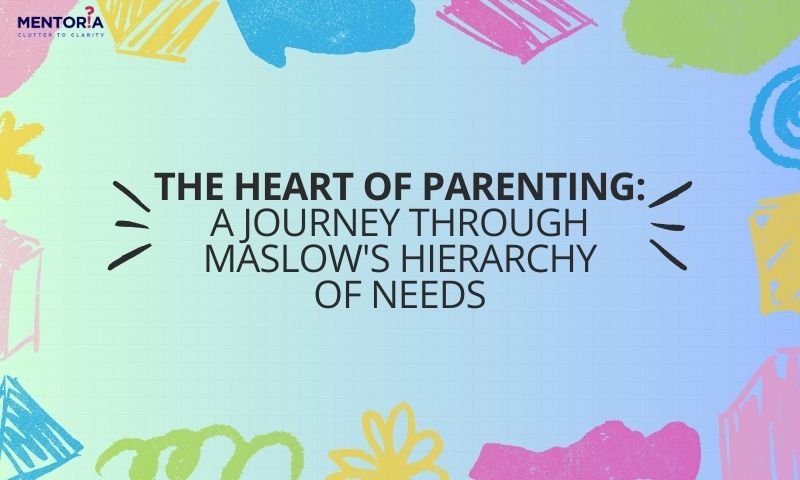The Heart Of Parenting: A Journey Through Maslow’s Hierarchy Of Needs

Parenting is a dynamic journey marked by a myriad of experiences, each presenting its unique set of challenges and triumphs. As parents navigate the intricate terrain of raising children, the question of whether they’re meeting their child’s needs effectively often arises. Fortunately, Abraham Maslow’s Hierarchy of Needs provides a practical framework that goes beyond psychological theory—it serves as a straightforward guide for understanding and connecting with your child on a deeper level.
Maslow’s Hierarchy of Needs outlines fundamental human requirements, offering parents valuable insights into their children’s behaviours and motivations. In this blog, we’ll tell you how this hierarchy can be a beneficial tool in meeting the essential needs of children, fostering a sense of security, belonging, and self-esteem. Join us as we uncover the applications of Maslow’s wisdom, empowering parents to create an environment where their children can flourish emotionally, socially, and intellectually.
The Foundation: Physiological Needs
At the very base of Maslow’s Hierarchy lies the cornerstone of human existence – physiological needs. It’s more than just satisfying hunger or ensuring a good night’s sleep; it’s about creating a stable platform for your child’s growth. When you provide nourishment, you’re not just filling their stomachs; you’re fueling the engine of their potential. Children with well-met physiological needs perform better academically, showcasing the profound impact of a nourished foundation. Lack of adequate sleep also impacts academic performance, with the National Sleep Foundation reporting that 60% of children under 18 experience sleep problems several times a week.
Parents meet physiological needs by providing nutritious meals, ensuring access to clean water, maintaining a safe living environment, and ensuring sufficient rest. Meeting physiological needs contributes to a child’s growth, energy levels, and overall health. Unmet needs can lead to physical discomfort, developmental issues, and hindered academic performance.
Financial constraints may pose challenges in providing adequate nutrition or suitable living conditions. Balancing work schedules to ensure proper rest can also be a hurdle. Parents can address nutritional needs by planning balanced meals within budget constraints. Ensuring a consistent sleep routine contributes to meeting the rest requirement, positively impacting a child’s health and well-being.
Climbing The Ladder: Safety Needs
Ascending the pyramid, we encounter the realm of safety and security – a need that extends beyond physical protection. Emotional security is the sunlight for a child’s emotional growth. Research emphasises that a secure emotional bond with parents fosters resilience, equipping children to navigate life’s challenges. Additionally, the Centers for Disease Control and Prevention (CDC) reports that adverse childhood experiences, including a lack of emotional safety, can lead to long-term health issues. Think back to the scraped knee – it wasn’t just a bandage they needed. It was the reassurance that you were their safety net, addressing emotional wounds with the same care as physical ones. Creating an environment where emotional safety is paramount lays the groundwork for confident, emotionally resilient individuals.
Parents ensure a safe home environment, establish routines, and provide emotional support, creating a sense of predictability. Meeting safety needs contributes to a child’s emotional stability, allowing them to explore the world with confidence. Unmet needs can lead to anxiety and hinder emotional development.
Economic instability, neighbourhood safety concerns, and balancing the desire for independence with the need for protection can pose challenges. Parents can install safety measures in the home, discuss and establish family rules, and provide emotional reassurance to address safety needs, fostering a secure environment.
Finding Belonging: Social Needs
As your child progresses, they enter the sphere of social needs – the desire to belong, make friends, and feel accepted. Beyond playdates and shared toys, positive social interactions are the building blocks of cognitive development. According to a study published in the journal “Child Development,” positive social interactions in early childhood contribute to enhanced cognitive skills later in life. Did you know that these interactions shape a child’s understanding of relationships and enhance their social intelligence? Visualise the joy when your child brings a new friend home; it’s not just about the playdate. It’s the initiation of connections that pave the way for a lifetime of meaningful relationships. Nurturing social needs isn’t just about companionship; it’s about sculpting the social architects of the future.
Parents encourage social interactions, facilitate playdates, and foster open communication to nurture a child’s sense of belonging. Meeting social needs contributes to a child’s emotional resilience, self-esteem, and the ability to form positive relationships. Unmet needs may lead to feelings of isolation.
Balancing screen time, addressing peer-related challenges, and fostering inclusivity can be challenging for parents. Parents can organise social activities, encourage participation in group settings, and model positive social behaviour to address social needs, promoting healthy connections.
Esteem: The Quest For Confidence
Moving upward, we reach the layer of self-esteem – an essential component of a child’s psychological landscape. It’s not just about applauding achievements; it’s about cultivating a sense of accomplishment. Research indicates that children with a healthy self-esteem are more likely to confront challenges with resilience. Remember the first time your child conquered a fear – whether riding a bike or excelling in a school project? Children with a strong sense of self-worth are better equipped to handle challenges and setbacks, according to the American Psychological Association. That glow of accomplishment wasn’t just pride; it was the sprouting of self-esteem, a vital ingredient for future successes. Fostering an environment that celebrates effort and achievement contributes to the confident, capable individuals our children are becoming.
Parents provide positive reinforcement, celebrate achievements, and encourage the development of skills and talents. Meeting esteem needs fosters a child’s belief in their capabilities, positively influencing academic and personal achievements. Unmet needs may result in self-doubt and lack of motivation.
Balancing constructive criticism with positive feedback, addressing societal pressures, and avoiding comparisons among siblings can be challenging. Parents can acknowledge efforts, set realistic expectations, and provide opportunities for skill development to address esteem needs, fostering a positive self-image.
The Pinnacle: Self-Actualisation
At the apex of Maslow’s pyramid lies self-actualisation – the realisation of one’s full potential. As parents, our role isn’t merely to mould; it’s to inspire and support our children as they unveil their unique capabilities. Studies suggest that fostering a sense of purpose in children leads to greater life satisfaction in adulthood. The National Survey of Children’s Health highlights that children who are engaged in extracurricular activities are more likely to develop a sense of purpose and achievement. Think of the moments you witnessed your child immersed in a passion – be it art, science, or sports. It wasn’t merely a hobby; it was a glimpse into their journey of self-discovery and actualisation. Creating an environment where curiosity is celebrated and passions are encouraged lays the foundation for a fulfilling, purpose-driven life.
Parents support a child’s interests, encourage autonomy, and provide opportunities for creative expression and personal growth. Meeting self-actualisation needs contributes to a child’s resilience, curiosity, and a lifelong love of learning. Unmet needs may result in a lack of direction and fulfilment.
Balancing academic expectations with personal interests, fostering a growth mindset, and supporting diverse talents can be challenging. Parents can expose children to various activities, encourage curiosity, and provide opportunities for pursuing personal interests, fostering a sense of purpose and fulfilment.
Nurturing Little Hearts, One Step At A Time
The five tiers, from physiological needs to self-actualisation, unveil the intricate layers that shape a child’s well-being. Recognising and addressing these needs not only fulfils the fundamental requirements for survival but lays the foundation for emotional, social, and cognitive growth. As parents, embracing Maslow’s wisdom allows us to cultivate a nurturing environment where our children can flourish. By understanding their needs at each level, we unlock the potential for resilient, confident, and fulfilled individuals. In the heart of parenting lies the power to guide our children through the journey of self-discovery, helping them ascend the steps towards realising their fullest potential.
Mentoria serves as an invaluable companion in the intricate journey of parenting, especially as families navigate the nuanced terrain outlined by Maslow’s Hierarchy of Needs. Our counsellors collaborate with parents, providing personalised guidance to address the unique needs of their children at every stage. Whether it’s navigating the challenges of meeting physiological needs, establishing a secure environment for safety, fostering social connections, building self-esteem, or nurturing a child’s self-actualisation, Mentoria is dedicated to empowering parents with the knowledge and tools they need to create a nurturing and fulfilling environment for their children’s growth.











